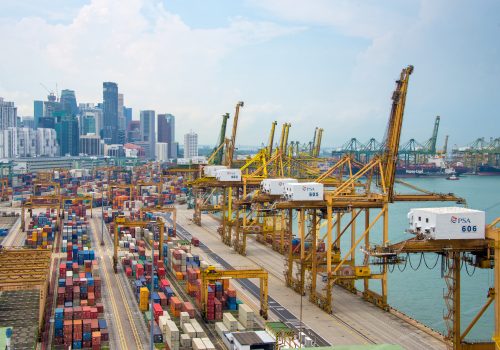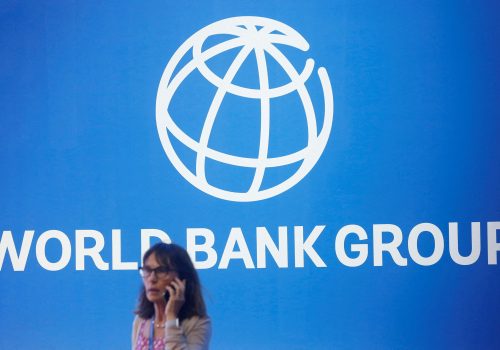The root causes of geopolitical fragmentation
The global economy is being fragmented by geopolitics, and that fragmentation has economic costs. That idea was a theme at the 2023 Spring meetings of the World Bank/International Monetary Fund (WB/IMF). Many commentators—typified by the Financial Times’ Martin Wolf—have also used the meetings as an opportunity to express their concerns about the intensifying strategic competition between the US and China. Wolf worries that efforts to decouple at least the high-tech segments of these two economies will reverse the significant benefits globalization has brought in the past nine decades.
Commentators have urged major countries to clearly identify the high-tech areas which require heightened government control to safeguard national security, and to ensure that, as Wolf writes, “security-oriented interventionism should be as precise and non-protectionist as possible, with a view to continuing to gain from the economies of scale granted by cross-border trade.”
Those concerns and proposals are well intended but will likely remain aspirational until policymakers can come up with economically credible and politically acceptable policies to deal with the root causes of fragmentation. The two most important are the resentment and resistance of the people left behind by globalization and the crisis of trust between major countries.
Globalization won’t work until we assist those left behind
Globalization has significantly lifted overall economic growth and helped many emerging market countries develop, bringing hundreds of millions of people out of poverty, but it has had a mixed impact in developed countries.
In developed economies, globalization has greatly benefitted consumers, owners of capital, and technologically skilled workers while depressing wage growth, exacerbating income inequality, and displacing low-skilled workers. It has hollowed out manufacturing sectors and communities which used to be the bedrock of the middle class and social stability. The numerous so-called losers have become the springboard for populist political movements that are pushing back against globalization. Some of the ire against globalization mistakes the true cause of job loss—technology has played a bigger role than trade—but that doesn’t change what needs to be done.
It is wrong-headed to blame the dismal outcome in developed countries on globalization. Instead, the blame should be put on the failure of national efforts to educate, train, and generally prepare workers to be able to compete internationally in a technologically driven world. In particular, many developed countries have implemented trade adjustment assistance (TAA) programs when they concluded free trade agreements to mitigate labor displacement impacts. In the US, the TAA program was launched in 1962. However, TAA programs, especially in the US, have been grossly inadequate, not well conceived and poorly executed, difficult for intended beneficiaries to access, and generally ineffective.
The US TAA program focused in its earlier years on workers able to document their displacement by trade with countries that had a free trade agreement with the US. It was later expanded to cover the impact of outsourcing—but it was always inadequate relative to the scale of the problem. In the US, 8 million manufacturing jobs were lost from a peak of 19.5 million in 1979 to a trough in 2010.
Only about a third of manufacturing workers who were displaced between 2001 and 2008 were eligible to apply for TAA benefits (including income assistance to extend unemployment benefits for up to 130 weeks and training for up to one year). Of those who applied, about one third actually received benefits.
Inadequate as it was, the US TAA program was better than nothing. Sadly, it was terminated in July 2022. By contrast, the European equivalent program has been expanded into the European Globalization Adjustment Fund to deal with all displacement effects of globalization. Active labor market adjustment programs in Europe have been much better funded than in the US—for example Germany spends 0.66% of GDP and France spends 0.99 percent, while the US spends only 0.11 percent. While Europe has done better than the US, it has not done nearly enough either. And its programs have been criticized as “narrow, piecemeal… hard to access at scale” and “reactive”.
Until there are credible efforts in developed countries to enable the people left behind by globalization and technological changes to participate in the benefits of inclusive growth, popular resentment and resistance to open and free trade will persist, especially in the US—leading to more protectionism, not less.
How to deal with the crisis of trust
The world is also suffering from a crisis of trust. As ably demonstrated by the NYT’s Thomas Friedman, that is especially true between the US and China and it is pushing them further apart. This collapse of trust has several dimensions. As China and several other emerging market countries have developed their economies, they want to reshape the rules facilitating international relations, including trade, which were established decades ago by developed countries. Today, those developed countries account for less than half of the global economy. The US as an incumbent leading power has viewed these developments with an increasing sense of national insecurity and has tried to protect its position.
Furthermore, international trade in goods has progressed from benign “shallow goods” like textile and garments, footwear, and similar consumer items to high-tech “deep goods” like electronics/IT and telecom enabled by semiconductors which have dual uses—civilian and military. Naturally cross-border trade and investment in such high-tech dual use goods have become areas of competition and conflict between the two superpowers.
Fundamentally, the problem is the absence of a mutually agreed framework allowing for the peaceful coexistence between two different and largely incompatible political and economic systems—represented by the US and China. Clearly the postwar institutions, especially the World Trade Organization, have shown signs of fractures and dysfunction, and need to be changed. Until the issues causing the crisis of trust are addressed, it is futile to simply call for international cooperation to restore the practices of global open free trade.
As the world becomes more fragmented politically and economically, the costs will mount and the risk of military conflict will rise. There will be calls to reverse such a dangerous trend. The way to do that is to address domestic challenges and build more inclusive economies in order to create the necessary internal political support for international cooperation. This will allow countries to figure out how to reconcile their different political and economic systems. The fact that these two challenges are interrelated makes their solutions much more difficult to conceive and implement. But there is no alternative but to try.
Hung Tran is a nonresident senior fellow at the Atlantic Council’s GeoEconomics Center, a former executive managing director at the Institute of International Finance and former deputy director at the International Monetary Fund.

At the intersection of economics, finance, and foreign policy, the GeoEconomics Center is a translation hub with the goal of helping shape a better global economic future.
Further reading
Tue, Apr 18, 2023
US trade agreements: Out with old and in the with new?
Econographics By
As the United States moves ahead with a new approach to trade with the Indo-Pacific Economic Framework for Prosperity (IPEF), should it really abandon the old model of trade agreements? Or should it consider adapting the new approach to the old model?
Tue, Apr 4, 2023
Five ways the World Bank can redefine its role in the global economy
New Atlanticist By Nicole Goldin, Mrugank Bhusari
With a new president on the horizon and an appetite for reform in the US and beyond, the World Bank is ready for change. It can start by focusing on these five policy priorities.

